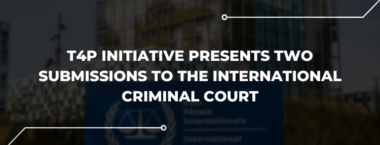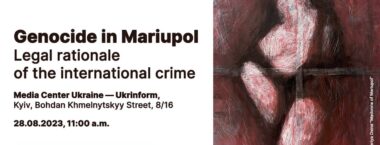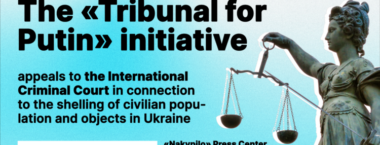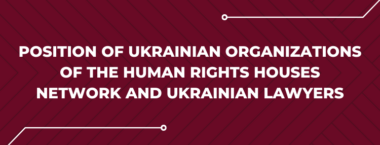
Torments, Torture Chambers, Executions: T4P Initiative Presents Two Submissions to the International Criminal Court
Information about extrajudicial executions of Ukrainians by the Russian military and Russian torture chambers in...
28 September 2023
As full-scale Russian aggression against Ukraine and the temporary occupation of its northern, southern, and eastern regions (in addition to the Donetsk and Luhansk regions and Crimea already occupied by Russian aggression in 2014), deepening of the negative impact of the total war on the execution of human rights and freedoms in Ukraine became obvious.
However, despite Russia’s undeniable responsibility for aggression, it is also clear that some lessons, not learned since 2014, are again leading to violations of human rights in Ukraine; primarily affecting those who are already in a vulnerable position and cannot use all their rights and freedoms. These are, first of all, people who are in so-called places of deprivation of liberty, serving sentences related to isolation from society; persons with disabilities, in particular those who are incapacitated or whose legal capacity is limited and stay in boarding institutions; patients of psychiatric care institutions; residents of geriatric institutions, etc. All of these people, due to their limited freedom of movement, physical and mental health, are unable to make decisions about their safety and well-being and are completely dependent on the actions, inactions, and decisions of the authorities.
Numerous reports of deliberate mass war crimes that have flooded the national and international media since the first days of the attack have mobilized the human rights community to establish ad hoc mechanisms to gather evidence and information from open sources about the crimes of the Russian occupiers. At the end of February 2022, the Ukraine 5 AM Coalition of Human Rights Organizations was established.
The goal of the Coalition is to collect and verify all reports of war crimes and crimes against humanity in order to ensure national and international justice and to hold the perpetrators liable. The Coalition focuses mainly on documenting crimes committed by the Russian military against Ukrainian citizens.
In addition to Ukrainian human rights organizations, international organizations have also stepped up their efforts. The report of experts within the OSCE Moscow Mechanism from late February to early April 2022 briefly mentions only a few cases of attacks on places of deprivation of liberty under the social care system. However, it lacks an analysis of the situation in places of deprivation of liberty in general, in particular penitentiaries. This underscores the need for thematic monitoring and documentation to analyze war crimes against various groups of people and civilian infrastructure.
The experience of monitoring human rights violations in connection with the conflict since 2014, and the evidence gained since the start of a full-scale invasion in 2022, has made some Coalition members identify human rights monitoring and documenting war crimes committed against inhabitants and staff of places of deprivation of liberty, as a separate work track. In addition, the organizations have also focused on the actions or inaction of the Ukrainian authorities to ensure the safety and well-being of these people.
Several members of the Coalition – the Ukrainian Helsinki Human Rights Union, Ukraine Without Torture, and Social Action Centre, came together in this work and were joined by Fight for Rights, a designated organization representing the community of persons with disabilities.
The reviewers decided to make a preliminary assessment of the human rights situation in places of deprivation of liberty in the three selected regions, and to begin analyzing the documented war crimes against inhabitants and/or staff.
A full review in English is available HERE.
A full review in Ukrainian is available HERE.
If you find an error on our site, please select the incorrect text and press ctrl-enter.

Information about extrajudicial executions of Ukrainians by the Russian military and Russian torture chambers in...
28 September 2023

The initiative of the T4P (Tribunal for Putin) presents its first document with systematic justification...
23 August 2023

Since the onset of the full-scale invasion, the «Tribunal for Putin» initiative has recorded about...
18 August 2023

Position of Ukrainian organizations of the Human Rights Houses Network and Ukrainian lawyers on the...
17 July 2023